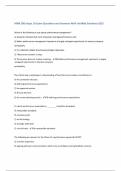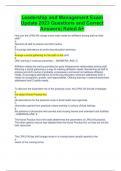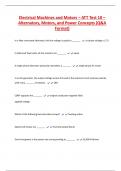Attempts to improve international relations 1924-1930
1. Explain the impact of the Dawes plan
• Dawes plan played a crucial part in ending the bitter conflict over reparations which had nearly
ended in war during the Ruhr occupatio
The Recommendations of the Dawes Pla
• The plan didn’t alter the reparations total fixed in 1921, it recommended a loan of 800 million gold
marks to be raised mainly in the USA to assist the restoration of the German economy, opened US
investment in German
• Annual reparations to start gradually and rise at the end of five years to their maximum, these
payments were to be guaranteed but the revenues of German railways and key industrie
• A committee of foreign experts sitting in Berlin under the chairmanship of a US official was to
ensure actual payments were transferred to Britain, France and Belgium so that the German
economy was not damaged, the plan was provision and to be renegotiated over the next 10 year
2. Explain reactions to the Dawes plan
British
• Welcomed in April 1924 by the Treasury as ‘the only constructive suggestion for escape from the
present situation, which if left must inevitably lead to war, open or concealed, between Germany
and France
• Involved the USA in extracting reparations from German
French
• Widely disliked the pla
• Not clear how Germans could be compelled to pay if they again defaulted and refused as in 192
• However, with Poincare’s defeat in the June 1924 elections, their willingness to cooperate markedly
increase
• If the French were to receive any reparations payments and to avoid isolation, they needed to go
along with the Dawes Pla
Germans
• Disliked as it placed key industries under international control and did nothing about scaling down
reparations debt
• Stresemann was now Foreign Minister and realised that Germany had no alternative but to accept if
France were to be persuaded to leave the Ruh
3. Explain the London Conference
• Agreement to implement Dawes and withdraw French and Belgian forces from the Ruhr within 12
months was achieved at the London Conference in August 192
• New European power balance was revealed when Britain and the USA devised a formula for
blocking France’s ability to act alone against Germany in the event of defaul
• If Germany refused payment, Britain as a member of the Reparation Commission would have the
right to appeal to the Permanent Court of International Justice at the Hague, and that a US
representative would immediately join the Reparation Commissio
• Join Anglo-American pressure would then be more than enough to restrain French occupation of
the Ruh
• Deprived of much of their influence on the Reparations Commission, France suffered a major
diplomatic defeat at Londo
4. Explain France's need for security
, • The Dawes plan by ending the Ruhr crisis had with German measure to stabilise the mark, made
Germany attractive for US investmen
• To some extent, one of the precursors for European economic recovery was in place, but investment
was by individuals and banks, not guaranteed by the US governmen
• Nor did it come with offers of military security to the French, should an economic crisis blow up
France could be left facing a strong German
• Initially the French had little option but to continue to insist as far as they could on the literal
implementation of Versaille
• They refused for instance, to agree the evacuation of the Cologne zone due in 1925 on the grounds
that Germany had not yet carried out the military clauses of the Treaty in ‘either spirit or the letter
5. Explain the negotiations of the Locarno Treaties
• The urgent need to reassure the French of Germany’s peaceful intentions, and secure the evacuation
of Cologne, prompted Stresemann on the British ambassador in Berlin’s unofficial advice to forward
a complex scheme for an international guarantee by the European great powers of the Rhineland
and of the status quo in western Europ
• Austin Chamberlain, British Foreign Secretary, first suspected the proposals were an attempt to
divide Britain and France, he then realised it was potentially an opportunity to achieve both French
security and the evacuation of Cologne without committing Britain to a military pact with France,
which the Cabinet wouldn’t tolerat
• Aristide Briand, now back in power knew that only within the framework of an international
agreement on the lines put forward by Stresemann could he commit Britain to coming to France’s
assistance if attacked by German
• Briand persuaded Chamberlain and Stresemann to widen the international guarantee to cover the
Belgian-German frontie
• He also attempted to extend it to Germany’s eastern frontiers but this was rejected by both
Stresemann and Chamberlai
• However, Stresemann did refer disputes with Poland and Czechoslovakia to arbitration, but refused
to recognise their frontiers with Germany as permanen
• to refer disputes with Poland and Czechoslovakia to arbitration, although he refused to recognise
their frontiers with Germany were permanen
• Chamberlain was specific that it was in Britain’s interests only to guarantee the European status
quo, told the commons in November 1925 in words that would haunt the government, that
extending the guarantee to the Polish corridor would not be worth the ‘bones of a British grenadier
• Negotiations at the Locarno Conference resulted in a number of treaties signed in December, most
importantly confirming the inviolability of the Franco-German and Belgian-German frontiers and
the Rhineland’s demilitarisatio
• The Treaties were underwritten by an Anglo-Italian guarantee to assist the victims of aggression, if
a minor incident on one of the Locarno frontiers occurred, the injured part would appeal to the
League’s Council, if upheld the guarantors would assist the injured state to secure compensation
from the aggresso
• In a serious violation the guarantors could act immediately, although the issue would eventually be
referred to the counci
6. Assess the Locarno Agreements
• USA and Western Europe had great enthusiasm for Locarno, appeared as real peace had finally
come, suggested France had finally achieved securit
• France gained least from Locarno, her eastern frontier was now secure, but under Locarno it
couldn’t threaten to occupy the Ruhr to pacify German aggressio
• Britain had given France the illusion of security, the provision for referring all but major violations
of Locarno to the League before acting ensured Britain a say on any action through its council
representativ
• Britain gained two major advantages from Locarno
• It tied France down and prevented re-occupation of the Ruh
• Improving relations between Germany and the West by holding out the prospect of German
League membership, discouraged close cooperation between Moscow and Berli
t
1. Explain the impact of the Dawes plan
• Dawes plan played a crucial part in ending the bitter conflict over reparations which had nearly
ended in war during the Ruhr occupatio
The Recommendations of the Dawes Pla
• The plan didn’t alter the reparations total fixed in 1921, it recommended a loan of 800 million gold
marks to be raised mainly in the USA to assist the restoration of the German economy, opened US
investment in German
• Annual reparations to start gradually and rise at the end of five years to their maximum, these
payments were to be guaranteed but the revenues of German railways and key industrie
• A committee of foreign experts sitting in Berlin under the chairmanship of a US official was to
ensure actual payments were transferred to Britain, France and Belgium so that the German
economy was not damaged, the plan was provision and to be renegotiated over the next 10 year
2. Explain reactions to the Dawes plan
British
• Welcomed in April 1924 by the Treasury as ‘the only constructive suggestion for escape from the
present situation, which if left must inevitably lead to war, open or concealed, between Germany
and France
• Involved the USA in extracting reparations from German
French
• Widely disliked the pla
• Not clear how Germans could be compelled to pay if they again defaulted and refused as in 192
• However, with Poincare’s defeat in the June 1924 elections, their willingness to cooperate markedly
increase
• If the French were to receive any reparations payments and to avoid isolation, they needed to go
along with the Dawes Pla
Germans
• Disliked as it placed key industries under international control and did nothing about scaling down
reparations debt
• Stresemann was now Foreign Minister and realised that Germany had no alternative but to accept if
France were to be persuaded to leave the Ruh
3. Explain the London Conference
• Agreement to implement Dawes and withdraw French and Belgian forces from the Ruhr within 12
months was achieved at the London Conference in August 192
• New European power balance was revealed when Britain and the USA devised a formula for
blocking France’s ability to act alone against Germany in the event of defaul
• If Germany refused payment, Britain as a member of the Reparation Commission would have the
right to appeal to the Permanent Court of International Justice at the Hague, and that a US
representative would immediately join the Reparation Commissio
• Join Anglo-American pressure would then be more than enough to restrain French occupation of
the Ruh
• Deprived of much of their influence on the Reparations Commission, France suffered a major
diplomatic defeat at Londo
4. Explain France's need for security
, • The Dawes plan by ending the Ruhr crisis had with German measure to stabilise the mark, made
Germany attractive for US investmen
• To some extent, one of the precursors for European economic recovery was in place, but investment
was by individuals and banks, not guaranteed by the US governmen
• Nor did it come with offers of military security to the French, should an economic crisis blow up
France could be left facing a strong German
• Initially the French had little option but to continue to insist as far as they could on the literal
implementation of Versaille
• They refused for instance, to agree the evacuation of the Cologne zone due in 1925 on the grounds
that Germany had not yet carried out the military clauses of the Treaty in ‘either spirit or the letter
5. Explain the negotiations of the Locarno Treaties
• The urgent need to reassure the French of Germany’s peaceful intentions, and secure the evacuation
of Cologne, prompted Stresemann on the British ambassador in Berlin’s unofficial advice to forward
a complex scheme for an international guarantee by the European great powers of the Rhineland
and of the status quo in western Europ
• Austin Chamberlain, British Foreign Secretary, first suspected the proposals were an attempt to
divide Britain and France, he then realised it was potentially an opportunity to achieve both French
security and the evacuation of Cologne without committing Britain to a military pact with France,
which the Cabinet wouldn’t tolerat
• Aristide Briand, now back in power knew that only within the framework of an international
agreement on the lines put forward by Stresemann could he commit Britain to coming to France’s
assistance if attacked by German
• Briand persuaded Chamberlain and Stresemann to widen the international guarantee to cover the
Belgian-German frontie
• He also attempted to extend it to Germany’s eastern frontiers but this was rejected by both
Stresemann and Chamberlai
• However, Stresemann did refer disputes with Poland and Czechoslovakia to arbitration, but refused
to recognise their frontiers with Germany as permanen
• to refer disputes with Poland and Czechoslovakia to arbitration, although he refused to recognise
their frontiers with Germany were permanen
• Chamberlain was specific that it was in Britain’s interests only to guarantee the European status
quo, told the commons in November 1925 in words that would haunt the government, that
extending the guarantee to the Polish corridor would not be worth the ‘bones of a British grenadier
• Negotiations at the Locarno Conference resulted in a number of treaties signed in December, most
importantly confirming the inviolability of the Franco-German and Belgian-German frontiers and
the Rhineland’s demilitarisatio
• The Treaties were underwritten by an Anglo-Italian guarantee to assist the victims of aggression, if
a minor incident on one of the Locarno frontiers occurred, the injured part would appeal to the
League’s Council, if upheld the guarantors would assist the injured state to secure compensation
from the aggresso
• In a serious violation the guarantors could act immediately, although the issue would eventually be
referred to the counci
6. Assess the Locarno Agreements
• USA and Western Europe had great enthusiasm for Locarno, appeared as real peace had finally
come, suggested France had finally achieved securit
• France gained least from Locarno, her eastern frontier was now secure, but under Locarno it
couldn’t threaten to occupy the Ruhr to pacify German aggressio
• Britain had given France the illusion of security, the provision for referring all but major violations
of Locarno to the League before acting ensured Britain a say on any action through its council
representativ
• Britain gained two major advantages from Locarno
• It tied France down and prevented re-occupation of the Ruh
• Improving relations between Germany and the West by holding out the prospect of German
League membership, discouraged close cooperation between Moscow and Berli
t








